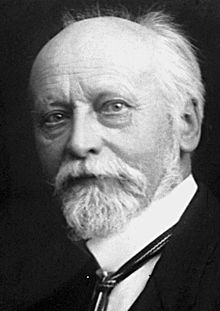Ludwig Quidde
| Ludwig Quidde | |
|---|---|
 |
|
| Born |
March 23, 1858 Bremen |
| Died | March 4, 1941 (aged 82) Geneva |
| Cause of death | Pneumonia |
| Resting place | Geneva |
| Residence | Germany |
| Known for | Nobel Peace Prize |
| Political party |
German People's Party, German Democratic Party, Radical Democratic Party |
Ludwig Quidde (March 23, 1858, Bremen – March 4, 1941) was a German pacifist who is mainly remembered today for his acerbic criticism of German Emperor Wilhelm II and a politician. Quidde's long career spanned four different eras of German history: that of Bismarck (up to 1890); the Hohenzollern Empire under Wilhelm II (1888–1918); the Weimar Republic (1918–1933); and, finally, Nazi Germany. In 1927, he was awarded the Nobel Peace Prize.
Born into a wealthy bourgeois merchant family, Quidde grew up in Bremen, read history and also got involved in the activities of the German Peace Society (Deutsche Friedensgesellschaft). In his younger years he had already opposed Bismarck's policies. In 1881 he received his PhD at the University of Göttingen. In 1894 Quidde published a 17-page pamphlet entitled Caligula. Eine Studie über römischen Caesarenwahnsinn (Caligula: A Study of Imperial Insanity). Containing 79 footnotes, the short essay is exclusively about the Roman Empire of the 1st century AD. However, Quidde drew an implicit parallel between the Roman Emperor Caligula and Wilhelm II, de facto accusing both rulers of megalomania. The author had insisted on publishing his pamphlet under his real name, which effectively ended his academic career as a historian when, in some periodical, a short review explained the parallels which otherwise might have gone unnoticed. After he made a derogatory comment on a new medal in honour of William the Great, German Emperor from 1871 to 1888, he was criminally convicted of lèse majesté, and sentenced to three months in prison, which he served in Stadelheim Prison.
...
Wikipedia
